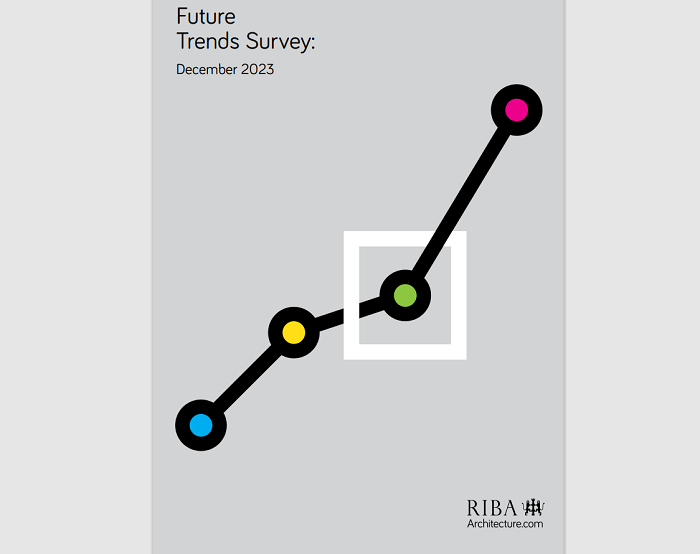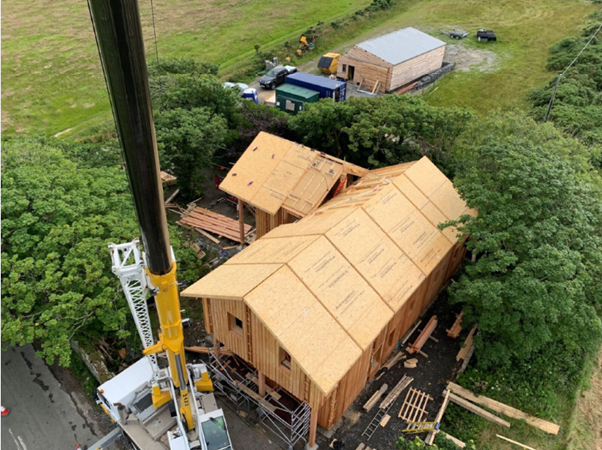The Royal Institute of British Architects (RIBA) has published the findings from its latest Future Trends Survey, a monthly report of business and employment trends affecting the architects’ profession.
December’s findings show that, over the next three months, architects continue to expect workloads and staffing levels to fall overall, but larger practices seem markedly more optimistic.
In December the RIBA Future Trends Workload Index fell by 3 points to -9. A negative balance indicates an overall expectation of falling workloads among architects.
Over the next three months, 20% of practices expect workloads to increase, 28% expect them to decrease, and 52% expect them to stay the same.
The outlook of small practices (1-10 staff) has worsened, falling by 3 points to -15, while medium (11+ staff) and large (50+ staff) practices reported a Workload Index figure of +30 – a 6-point increase from November.

In terms of sectors, all monitored work sectors maintain a negative outlook on future work, with three out of four more pessimistic than the previous month. The outlook for the Private Housing sector held steady at -16, the Commercial sector fell by 4 points to -5, the Public sector fell by 2 points to -9 and the Community sector fell by 7 points to -9.
Regionally, the picture remained mixed, with Wales and the West falling back into negative territory after last month’s recovery, down by 19 points to -17; London (-5), the South of England (-14) and the Midlands & East Anglia (-23) all worsening; and the North of England improving by 9 points to +5.
In December, the RIBA Future Trends Permanent Staffing Index rose by 1 point to -2, indicating a slight improvement, but practices still expect their permanent staff numbers to decrease over the next three months.
- Over the next three months, 9% of practices expect to employ more permanent staff, 11% expect to employ fewer, and 80% expect no change.
- Small practices continue to expect staffing levels to decline, returning a Permanent Staffing Index figure of -5, the same as in November.
- Medium and large practices once again expect an increase in permanent staff, returning a combined Permanent Staffing Index figure of +19, a considerable 14-point rise from November.
- The regional outlook on permanent staffing is varied. The South of England, with a Staffing Index figure of +5, is the only region where practices expect an increase in permanent staffing levels.
- The Temporary Staffing Index slipped marginally to -6, suggesting falling numbers of temporary staff over the next three months.
- Levels of personal underemployment increased from 22% in November to 26% in December.
RIBA Head of Economic Research and Analysis Adrian Malleson said: “While the Consumer Price Index (CPI) and construction output price inflation are both on a downward trend, this has yet to translate into an uptick in architects' commissions. These results indicate practices expect to reduce workloads and limit recruitment as they head into 2024.
“Practices also continue to report the challenges of still high inflation, high interest rates, elevated project costs, and ongoing planning delays, alongside diminished pipelines of work and low levels of enquiries. Some note planning delays being exacerbated by the level of detail required in planning submissions, deterring the progression of potential projects.
“We are also aware of heightened competition, including from 'architectural designers', which continues to intensify the downward pressure on fees, and an increasing number of reports of clients failing to pay invoices on time, threatening practice cash flow.
“RIBA Business Benchmarking 2023 provides a more detailed analysis of business trends affecting the profession last year.
“We will continue to report our findings to the Government and work with other built environment bodies to monitor these trends.”




















